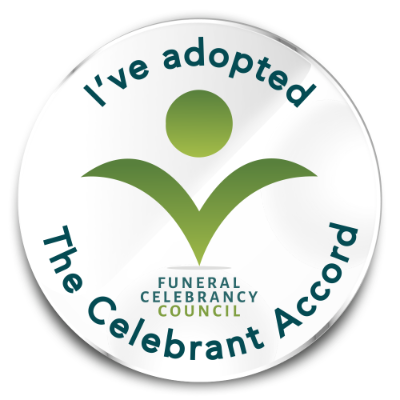Perhaps it’s time to stop attending funerals and take our ceremonies online?
I’m a funeral celebrant and grief counsellor, and for seven years I have been creating person-centred funeral services, following an evidence-based belief that a meaningful funeral ceremony has not only purpose, but potential therapeutic benefit to bereaved people. Now, in the light of the coronavirus pandemic, I feel that we need to stop attended funeral services if reduced numbers and other restrictions are going to cause further distress. For the sake of each other and the NHS, perhaps we should stop gathering together in person, altogether?
In South Korea it was determined that Covid-19 infection had spread to a hospital through a funeral ceremony attended by members of the church, and in Newfoundland sixty out of 82 cases in the province were traced to two services that took place at a funeral home. Italy has banned funerals altogether, and just as I go to post this blog I hear that a 65 year old Mum has died after attending her own mother’s funeral. Sixteen more members of the family have symptoms of the virus. Not being able to attend a funeral will be painful, but not as painful as the conditions we are seeing now.
Article: How Coronavirus is denying dignity to the dead in Italy, BBC News https://www.bbc.co.uk/news/health-52031539
Article: St John’s Funeral Home a Covid-19 ‘epicentre’ after almost 60 cases traced to two wakes, National Post https://nationalpost.com/news/st-johns-funeral-home-a-covid-19-mini-epicentre-after-more-than-60-cases-traced-to-two-wakes?fbclid=IwAR2BxGKU21z0WQUMzUnK712lgG8Qs7sVv5N1keO-ny88ApoenTLEx_swKMw
Here in the UK, celebrants are talking to each other and many feel that what they are seeing at the crematorium is unbearable. Many, including myself, are now refusing to go on officiating in person services as confirmed cases of coronavirus rise, as it feels irresponsible to do so. This is not because of any risk from the dead but the risks to one another from the living.
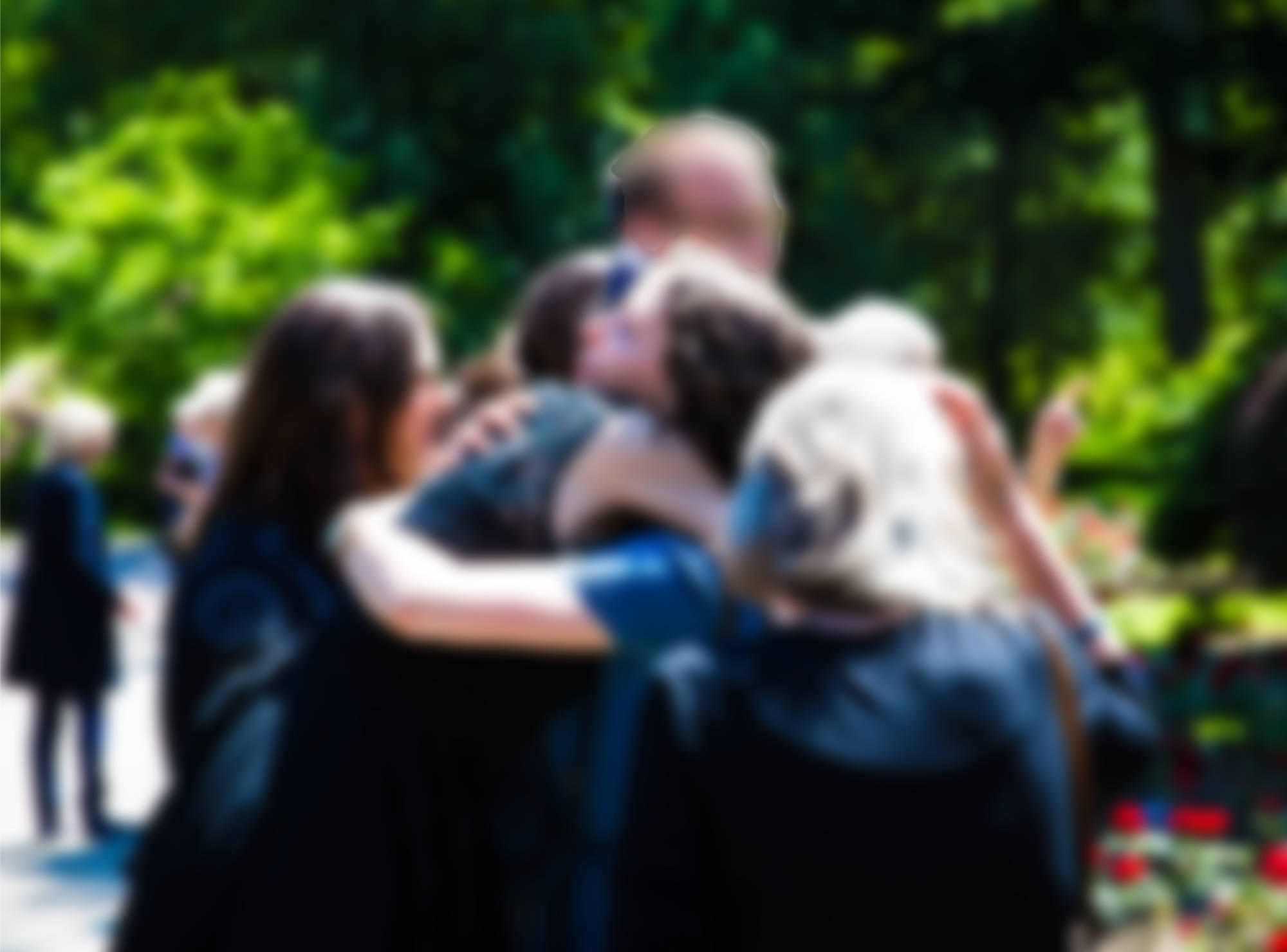
On Friday 27 March, Fran Hall of the Good Funeral Guide pleaded a case for stopping funerals here in the UK. I can’t believe that I’m saying this but, after all that I have heard from celebrants, clients and in news media, I agree with her: we should stop gathering in physical space for funeral services, if gathering is causing people even more distress.
Funerals are not just for nearest and dearest to say ‘Goodbye’. A vital part of being able to tolerate the pain, for many people, is the gathering of community around them. For so many, funerals have always been about numbers, about people showing up from near and far, not only to show how much they care for the person who has died, but to support those who survive. Hayley Smallman said on Radio 4 this morning about her daughter Holly’s funeral, “It feels really scary to us as a family, but to be going into an empty crematorium and not be surrounded by people who love you the most, your friends, your family… it’s really scary.”
Article: Holly’s funeral was for hundreds of people, now it’s just us https://www.bbc.co.uk/news/newsbeat-52047203
Researchers and therapists alike always stress the value of social support in times of bereavement. The amount of support that we receive has a direct effect on our ability to cope with our circumstances, yet current restrictions on those allowed to attend a funeral deprive people of that necessary and vital resource. Instead parents, siblings and children attend a sparse ceremony alone. Alone they walk away from the crematorium uncomforted to travel through empty streets.
Funeral directors and celebrants are also seeing that it is not possible for people to maintain ‘social distancing’ when they see others in emotional distress. This last week, in crematoria children have been seated 2 metres away from their parents, causing significant distress to both parent and child. The current situation can be unbearably painful for those closest to someone who has died. Close relatives may feel they should attend a funeral, even without wider family, elder family members, or friends to support them — yet they don’t want to.
What is not being discussed, nor suggested by funeral directors, are the many more ways that we can come together to mourn, to honour and remember. We don’t have to wait until after the summer, or next year, to hold an in person ceremony or memorial. We can have an online ceremony now and ‘real life’ memorial later. Church services are already being held online. We can hold funeral services online too. The offer of a memorial ceremony at a later date is just not enough and can seem desperately far off
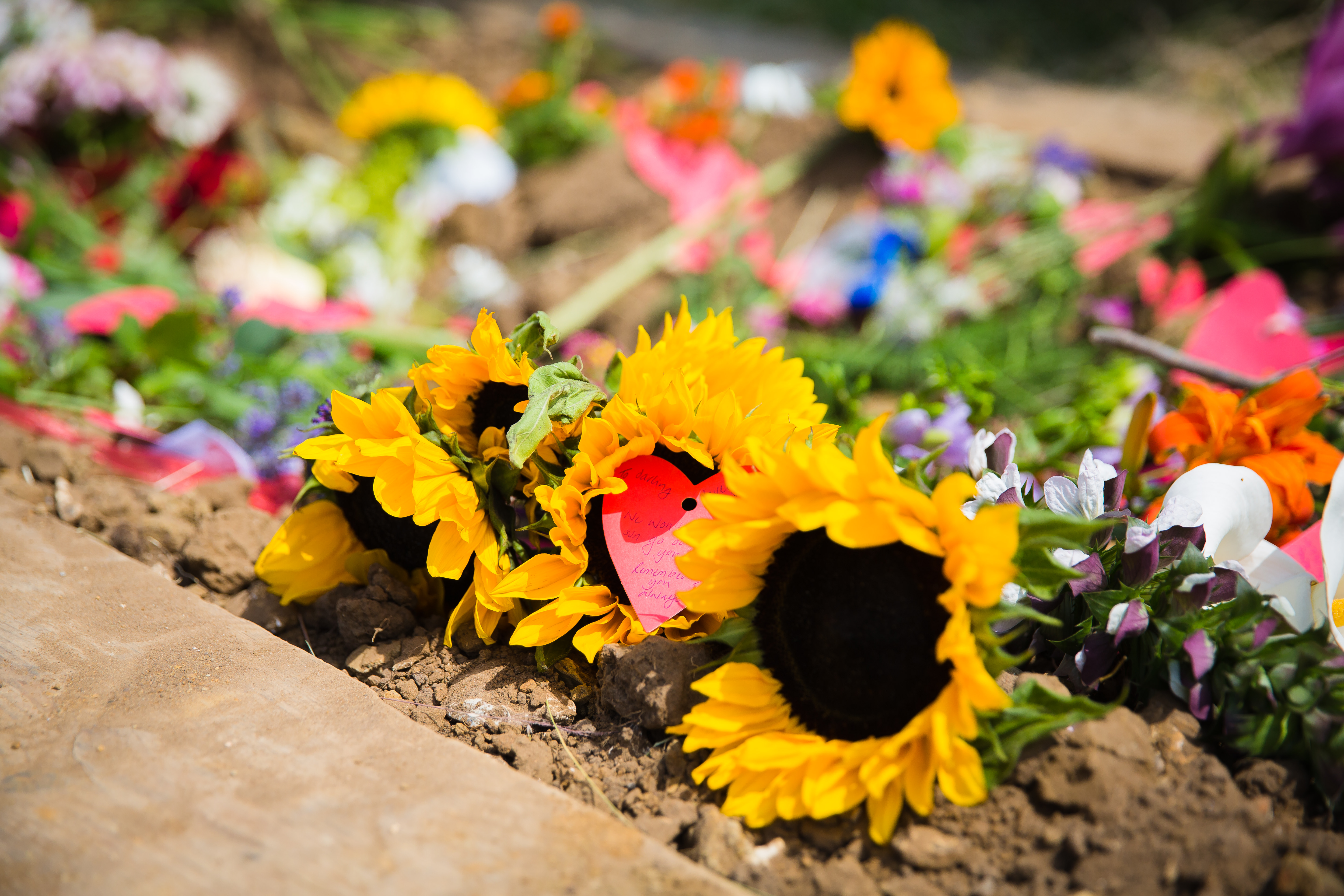
I have spent the last seven years facilitating funerals, encouraging people to engage with funeral rituals and ceremonies as a way to process their bereavement and pain. I’m not going to change my mind about the value of a meaningful funeral ceremony just because of coronavirus. However, for the time being, I am taking funeral ceremonies online so that we can honour those we love, feel the support of our family, friends and community and ‘Stay At Home’.
The present situation is fraught with uncertainty and changes. Uncertainty is, for most humans, psychologically harder to tolerate than a certain negative outcome, and yet Government guidelines are vague and interpreted differently all over the country. If there was a decision to stop attended funerals, we would know where we stand and we could then adapt to those circumstances proactively. Instead restrictions are changing day to day. Mourners are left uncertain as to whether a funeral will go ahead and, if it does, whether they will be allowed to attend.
In most parts of the country funeral numbers at crematoria are now restricted to between five and 25 mourners depending on the policies of each local venue, usually a crematorium, and rules change daily. This is causing further distress to people who are already in pain. Social distancing requirements for bereaved people at a funeral are pointless and are not working. What we are really talking about here is not actually social distancing but physical distancing. Mourners are forced to sit apart inside the chapel and yet outside the chapel people hug and kiss, and shake hands as normal, because every fibre of their being tells them to. It’s an impossible impulse to resist physical contact when grieving. Being forced to do otherwise may be psychologically torturous.
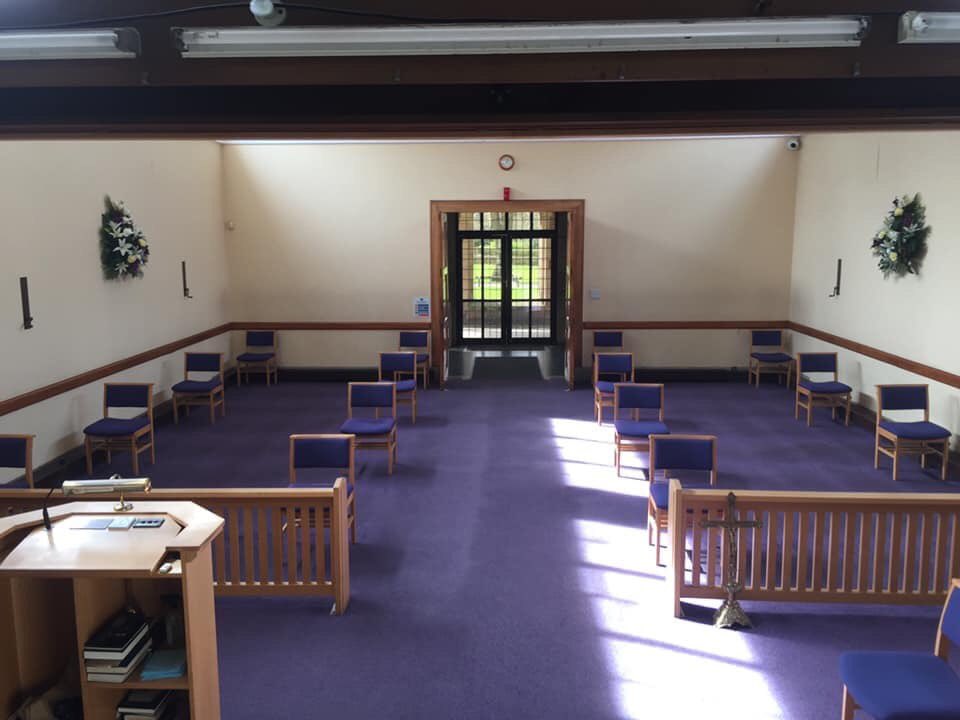
So, let’s stop making impossible rules for grieving human beings.
Instead of gathering in ‘real life’, let’s take funerals online for now. Death is real life. Whether we celebrate and mourn online or in person, we need to meet the need to grieve and the need for support in that grief.
Once we consider the possibility that having a ceremony online allows us to gather safely, and calmly with plenty of support, in our own home, we can start to explore our options.
Many of the social platforms which we already know allow us to do the things that we would do when we gather for a funeral ceremony. For those who cannot manage the technology of video chat, there are more basic options — the phone, or snail mail.
Blog post: 8 things you can do to support each other online when someone has died.
Nothing is the same now, for bereaved people, or for any of us. We can hold beliefs that there is a way that things should be done, but we have to let them go. Do what feels right for you and your family and friends. Abandon what others think ‘should’ be done, abandon convention, be creative. Think of the person you are missing and what they might have enjoyed. Be together in any way you can, use all virtual and remote means to be together. You might believe that nothing is as good as seeing someone in person, but that isn’t possible right now, so let that belief go and get the most out of seeing family and friends through a camera or talking to them on the phone.
If you feel like it would help you to have a funeral ritual, even though you can’t go to a cremation or burial, then you can call a specialist celebrant and arrange to have them lead you either through a formal funeral ritual online, or something less formal just to give a sense of structure and ceremony to some time together honouring and remembering the person who has died. This will give you a chance to acknowledge your loss and begin to get used to the idea that they have gone. If you choose to have to an online funeral you can at the same time begin to plan a ‘real life’ memorial. You can find a list of really good funeral celebrants who are offering ceremonies online at ukfunerals.online or you may find local celebrants who can offer this service.
For both an online funeral ceremony and a memorial you can incorporate pieces from your shared photo albums and music lists, together with the memories that you have shared, into ceremonies that will make the memory of the person you are remembering all the more vibrant, as you gather in their name.
Funeral services were never really about ‘closure’. Though we use the word a lot, they are more to acknowledge that when someone dies everything left behind changes, and they mark the beginning of us growing used to that, which takes a bit of time. If someone you love has died and you can’t go to a funeral consider having an online funeral service to help you pull together your memories of that person and process your loss. Then plan a true celebration of life memorial for a time when we can once again gather together in person to remember, celebrate, hug and dance, or whatever you do as you celebrate everything that your person means to you.
So, please don’t feel that if you can’t have a funeral at the crematorium or church that you are out of options. Even when you can have a funeral, these are becoming more and more restricted and, with that, more painful and distressing for those who mourn. You might find it more comfortable to have an online funeral now and be planning a memorial for a later date. Let’s use all this amazing technology to give us all the support we can, and let’s get through this together.
updated 23 May 2020
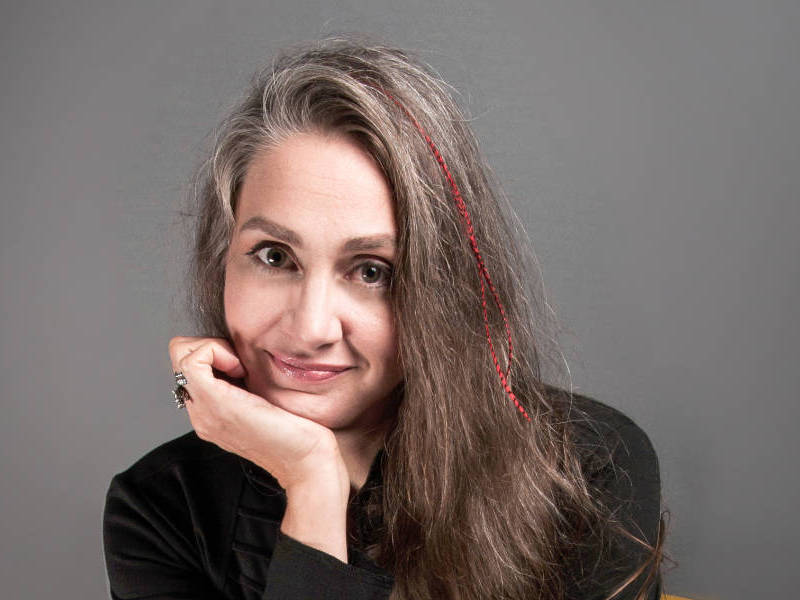
Emma Curtis is an award-winning secular minister, opera singer and grief and resilience counsellor, based in Surrey with a therapy practice in London’s West End. She is the founder of Ceremony Matters, offering advanced trainings, support and mentoring to funeral celebrants. Learn more about Emma here
About Us
Ceremony Matters offers advanced trainings, continuing professional development, support and mentoring to funeral celebrants across the UK. Celebrant Support is a professional support service in person, online or over the phone.
Get In Touch
text 07768 878764 for Celebrant Support
1:1 sessions:
Cavendish Square W1G 0PH
Myddelton Square, Islington EC1R 1YB
and online.
We Have Adopted The Accord. Emma is proud to have been a part of the development of the Funeral Celebrant Accord as a representative on the Funeral Celebrancy Council. She is the council’s representative of Independent Celebrants.

